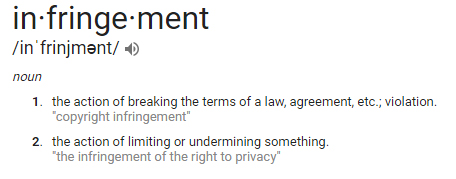What is Vendor Infringement?
Vendor infringement cases typically fall under the other sections of this book for infringement discussed in the respective section topics for IP violations.
It is important to note that Amazon is often dismissed from vendor infringement cases because courts generally hold that Amazon is immune from liability from third party vendors.1
- Perfect 10, Inc. v. Amazon.com, Inc, No. CV 05-4753 AHM (SHx), 2009 U.S. Dist. LEXIS 42341 (C.D. Cal. May 12, 2009).
- Corbis Corp. v. Amazon.com, Inc., 351 F. Supp. 2d 1090, 2004 U.S. Dist. LEXIS 27155, 77 U.S.P.Q.2D (BNA) 1182 (W.D. Wash. 2004).
In this case, plaintiff claimed to have copyright interests in two photographs that Amazon placed on it’s website, IMDb.com, as well as hundreds of photographs that were being sold by vendors on Amazon without the Plaintiff’s permission. Amazon is protected from liability under the DMCA for copyright infringement occurring on its third party vendor platform. Amazon qualifies as an Internet Service Provider protected under DCMA, does not have affirmative duty to police possible infringement, but must take reasonable steps if is alerted to infringement.
- Milo & Gabby, LLC v. Amazon.com, Inc., NO. C13-1932RSM, U.S. Dist. Ct., W.D. of Wash., 2015.
Amazon won this infringement case under defense of DMCA – Amazon is immune from liability for infringement by third-party vendors.
- Perfect 10, Inc. v. Amazon.com, Inc., 508 F.3d 1146, 2007 U.S. App. LEXIS 27843 (9th Cir. Cal. 2007).
Amazon.com was a defendant in this copyright infringement case brought by Perfect 10. The district court preliminarily enjoined defendant, Google from creating and publicly displaying thumbnail versions of plaintiff copyright holder’s images, but did not enjoin the search engine operator from linking to third-party websites that displayed infringing full-size versions of the images. Both Perfect 10 and Google appealed. The court of appeals reversed the district court’s ruling and vacated the preliminary injunction regarding Google’s use of the thumbnail images. Additionally, the court reversed the district court’s rejection of the claims that Google and Amazon were secondarily liable. All other rulings were affirmed.
- Routt v. Amazon.com, Inc., 2012 U.S. Dist. LEXIS 170602, 105 U.S.P.Q.2D (BNA) 1089, Copy. L. Rep. (CCH) P30,334 (W.D. Wash. Nov. 30, 2012).
In this case, plaintiff claimed that Amazon violated her copyrights in certain photographs because certain Amazon Associate websites displayed her photographs without her permission. The court found Amazon was not responsible for the alleged violation committed by a third-party, and could not be vicariously liable as it had no control over the third-party’s activities.
- TRE Milano, LLC v. Amazon.com, Inc., No. S205747, 2012 Cal. LEXIS 11039 (Nov. 28, 2012).
Plaintiff’s case against Amazon was dismissed because Amazon was not responsible for the infringement of a third-party, and could also not be held contributorily liable since Amazon took immediate action once it was notified of the third-party’s infringement.
